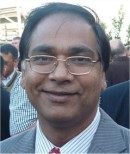

Plenary Lecture
Ensuring Learning and Teaching Standards and Quality Outcomes in Assessing Final Year Engineering Projects

Associate Professor Mohammad G. Rasul
School of Engineering and Technology
Central Queensland University
Rockhampton, Australia
E-mail: m.rasul@cqu.edu.au
Abstract: The final year engineering projects (FYEPs) is the culminating learning experience of engineering programs. It requires students to demonstrate that they can integrate knowledge, skills and professional graduate attributes developed during the program and perform at a standard expected of graduates. Accreditation guidelines require engineering programs to show that students are capable of personally conducting and managing an engineering project to achieve a substantial outcome to professional standards. These requirements are also required from international engineering accreditation agreements such as Washington Accord and International Engineering Alliance. The purpose of this presentation is to outline the development of tools and processes to ensure the required quality outcomes in FYEP areas are achieved. In particular, the talk will outline on; Tools to evaluate how well students can apply much of the knowledge gained during their university studies in solving a real life problem (i.e. a good practice guideline for assessment of FYEPs based on the Threshold Learning Outcomes for Engineering); Clear definition of educational purposes and expectations of FYEPs, particularly in the key area of research skills; and Benchmarking of these outcomes based assessment practices with industry partners and with Competency Standards of Institution of Engineers in the respective country.
Brief Biography of the Speaker: Associate Professor Mohammad Rasul obtained his PhD in the area of Energy, Environment and Thermodynamics from The University of Queensland, Australia. He received his Master of Engineering in Energy Technology from Asian Institute of Technology, Bangkok, Thailand. His first degree is in Mechanical Engineering. Currently, he is an Associate Professor in Mechanical Engineering of the School of Engineering and Built Environment at Central Queensland University, Australia. He is specialised and experienced in research, teaching and consultancy in the areas of thermodynamics, energy (industrial and renewable) and environment, and resource industries and sustainability. He has published more than 200 research articles/papers both in reputed journals and refereed conferences including 7 book chapters, two edited books, one awarded paper in a refereed journal and two awarded papers at conferences in the area of energy and thermodynamics. His research has made significant impact to national and international scientific communities through a large number of citations and h-index. His contributions to the professional community have been demonstrated through his varied roles and activities, such as membership of national and international technical, scientific and advisory committees, membership of different professional organizations and various organizing committees. He has been leading and contributing to the strategic research on Resource Industries and Sustainability in Energy and Environment. He has also made significant contributions in engineering education research and scholarship. He has published several refereed conference papers and book chapters in the area of project based learning and innovative teaching practices. He has edited a book on Developments in Engineering Education Standards: Advanced Curriculum Innovations published by IGI Global publisher in USA.